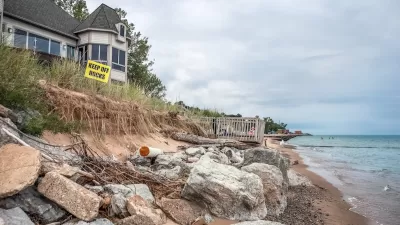The conference brought together local planners and policymakers to develop strategies for boosting resilience in coastal areas while maintaining affordable housing stock.

A conference organized by the Tampa Bay Regional Planning Council (TBRPC) and other partners “focused on proactively determining new strategies and approaches to ensure new housing construction is affordable and resilient to increasing flood risks and a changing climate,” according to an article by Mark Parker in the St. Pete Catalyst.
“Climate change and sea-level rise present an incredible additional layer of challenges to the housing situation, said [St. Petersburg City Councilmember Brandi Gabbard]. Especially in St. Petersburg, where much of the city exists within a coastal high hazard zone.”
The Resilience and Energy Assessment of Communities and Housing (REACH) conference highlighted the importance of tying housing affordability to resilience efforts. “In addition to topics such as reducing energy costs through efficiency, an update on the Pinellas Countywide Housing Compact and new information released in partnership with the University of Florida identifying area flooding ‘hotspots,’ a key part of the conference was the unveiling of the Keep Safe Florida program for property owners and managers.” According to the article, “The program provides easily accessible tools to assess a development’s vulnerability to climate-related events, specialized training and assistance to develop action plans and implement assessment recommendations. It also provides a funding resource guide to help implement resilience strategies.”
FULL STORY: REACH conference highlights the need for resiliency in affordable housing

Alabama: Trump Terminates Settlements for Black Communities Harmed By Raw Sewage
Trump deemed the landmark civil rights agreement “illegal DEI and environmental justice policy.”

Planetizen Federal Action Tracker
A weekly monitor of how Trump’s orders and actions are impacting planners and planning in America.

Why Should We Subsidize Public Transportation?
Many public transit agencies face financial stress due to rising costs, declining fare revenue, and declining subsidies. Transit advocates must provide a strong business case for increasing public transit funding.

Understanding Road Diets
An explainer from Momentum highlights the advantages of reducing vehicle lanes in favor of more bike, transit, and pedestrian infrastructure.

New California Law Regulates Warehouse Pollution
A new law tightens building and emissions regulations for large distribution warehouses to mitigate air pollution and traffic in surrounding communities.

Phoenix Announces Opening Date for Light Rail Extension
The South Central extension will connect South Phoenix to downtown and other major hubs starting on June 7.
Urban Design for Planners 1: Software Tools
This six-course series explores essential urban design concepts using open source software and equips planners with the tools they need to participate fully in the urban design process.
Planning for Universal Design
Learn the tools for implementing Universal Design in planning regulations.
Caltrans
Smith Gee Studio
Institute for Housing and Urban Development Studies (IHS)
City of Grandview
Harvard GSD Executive Education
Toledo-Lucas County Plan Commissions
Salt Lake City
NYU Wagner Graduate School of Public Service





























